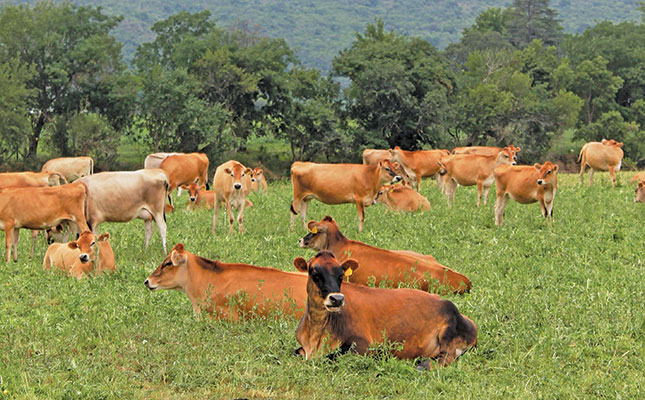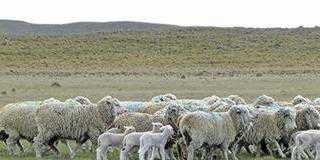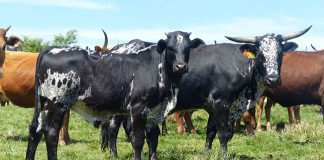
Photo: Lloyd Phillips
Alan and Frances Webster arrived in the Weenen area of KwaZulu-Natal (KZN) in late 1990, ready to take their first steps towards becoming commercial dairy farmers.
The young couple had long been scrimping and saving towards achieving this goal during Alan’s time as a farm manager and Frances’s sojourn as a lecturer at a teacher training college in Mpumalanga’s Nelspruit area.
Yet even these savings were insufficient, which meant that the Websters had to ask for a private loan to cover the costs of getting their dairy farm off the ground.
Frances recalls that banks were not interested in loaning her and Alan any money, as the couple did not have an official credit history. Undeterred, they pressed ahead, spending the money they had saved to buy 37ha of irrigated pastures in the Weenen area, and purchased a nuclear herd of 20 Jersey cows.
During Farmer’s Weekly’s interview with the Websters, it quickly becomes apparent that they are not recounting their story to boast about their successes. Rather, they hope that their efforts to overcome challenges through passion, patience, hard work and determination will inspire other aspiring farmers to never give up on their dreams.
Believing in themselves
“Before we arrived here, and for some time thereafter, there were many naysayers who told us that dairy farming wouldn’t work in Weenen; that our operation was too small to be economically viable; and that our lack of experience and knowledge of dairy farming would disadvantage us.
Milk-buying companies weren’t prepared to send trucks out to our small dairy farm in Weenen,” says Frances.
But there was no turning back at this late stage; they had already bought the land and the small dairy herd.
The couple recall that for the first five years, they operated in “survival mode”; they used a tiny four-point milking parlour to produce about 250ℓ of milk a day.
Alan, Frances and some of the five farmworkers whom they could afford to employ at that time, manually filled 500ml bottles with milk, and sold these daily to customers at Weenen’s bus rank, in the local traditional authority areas, and to hawkers.
While Frances mainly managed the dairy operation, Alan’s primary responsibility was the milk deliveries and sales.
“[Operating in this way was] risky, because I was dealing in cash at that time, and I was once robbed at gunpoint,” he recalls.
“But we were able to stay afloat and even slowly grow our Jersey herd, and hence our milk production.
“An added advantage of living in Weenen was that much of the local agricultural land had already been subdivided into relatively small parcels for fresh produce production. Sometimes a piece of land came up for sale and we were able to buy it. This helped us to gradually grow our grazing, herd and overall business.”
By 1994, the operation was increasingly producing fresh milk in excess of the local market’s needs. Putting their heads together, they decided to turn this highly perishable excess milk into cheese, which had a longer shelf life.
Their first step in this direction was to attend a cheese-making course at the Agricultural Research Council’s (ARC) Irene campus in Gauteng.
By then, they had hired a driver to take over the fresh milk deliveries and sales in and around Weenen, allowing them to work together to manage the dairy and make cheese.
“At peak production, we were making about 120kg of cheese per batch, consisting of gouda, cheddar, mature cheddar, and even our own Weenendale cheese. We sold some of the cheese locally and the rest to farm stalls in the KZN Midlands,” Frances says.
Borrowing with care
During the first decade of the business, they gradually built up a positive credit record. They began using this to get strategic loans from agricultural co-operatives and from banks for buying essential capital items, such as tractors, and expanding the business.
They have continued to use loans over the past 20 years to carefully grow the business to its current size of just over 1 000 Jersey cows, fed on 220ha of irrigated pastures and milked by two swing-over parlours of 20-a-side and 30-a-side respectively.
“A milestone for our business came in 2000, when we signed a milk supply agreement with Nestlé,” says Frances.
“This meant we didn’t have to process, deliver and market our milk and cheese anymore. Nestlé began collecting all of our milk production, which left us free to focus on managing our herd better and improving our business.”
Today, most of the farm’s pastures comprise hybrid annual ryegrass of the Barmultra II Italian temperate variety produced and sold by Barenbrug, with lucerne and/or chicory and/or kikuyu mixed in.
Hard-working Jerseys
Over their typical 305-day lactation, the Websters’ Jersey cows, all of which are registered with SA Studbook, produce an average of 18ℓ of milk per day, equating to 5 611ℓ per cow per lactation.
According to the ARC’s milk recording scheme, the solids in the milk produced by Foundation Farm’s Jersey cows average 4,8% butterfat and 3,67% protein.
(The data collected by the scheme helps contribute to cost-efficient milk production by South Africa’s dairy farmers.)
Through holistic herd health management, Alan and Frances have been able to keep the somatic cell counts of their herd’s milk consistently below 200 cells per millilitre of milk.
This is well below the widely accepted 100 000 cells per millilitre of milk produced by a cow with a healthy udder.
The Websters achieved a major milestone in 2014, when one of the couple’s two daughters, Jane Schiever, and her husband, Barry, joined the operation. This did not take place overnight; the couples deliberated at length over whether the business could sustain two households.
They also had to feel confident that they could work well together and share a common vision for the business. Only once these issues had been decided on did they enter a formal partnertship.
“For some time before Barry and Jane joined us, Frances and I were uncertain about the future of the dairy business that we’d built up over the years and loved so much,” says Alan.
“We were getting older, but still had a vision for what it could achieve. But we needed trusted and dedicated help to do this as Frances and I slowly started having less and less responsibility in the business and Barry and Jane began taking on more.”
Alan and Frances were particularly pleased that their daughter and son-in-law had not been forced to join Foundation Farm out of necessity. Each held a secure job (Barry as an agricultural packhouse manager and Jane as a registered dietitian) when the idea for establishing the partnership evolved.
Simply put, the Schievers joined Foundation Farm because they chose to, which assured Alan and Frances that they, too, wanted to see the operation continue from strength to strength.
Fresh ideas and energy, plus valuable experience
As one of the Websters’ daughters, Jane is exceptionally proud of what her parents have achieved with Foundation Farm since 1990. She also believes that the partnership between the Websters and the Schievers is “respectful and robust”.
“There’s an excellent combination of the experience of the older generation and the energy and new ideas of the younger generation. My parents have given us the space to try new ideas for the business. Barry and I were fortunate to have come into a solid business structure and we see a lot of potential for us and our children taking the business forward,” Jane explains.
Barry adds that his parents-in-law allow him and Jane to make their own mistakes and learn from them. All four, however, share a conservative approach to the business’s finances.
“We don’t buy new things for show. Before making a purchasing decision, we first calculate the cost versus the necessity and potential return on investment of the item. If an item is old but still functional, it can be given lighter work on the farm. If it’s going to do constant heavy work, then it must be bought new and be of the best quality that we can afford at that time.”
Alan and Frances are at pains to point out that they could not have succeeded without help.
In addition to the productive partnership with the Schievers of the past five years, key contributors have included dedicated farm staff, some of whom have been with the Websters since they first moved to Weenen; dairy consultants and input suppliers who have often gone well beyond the call of duty to help them out during difficult times; and the generations of Foundation Farm’s Jersey cows.
“The Jersey genetics that we’ve been privileged to breed and farm have had many positive traits that have been essential to the success of our business,” says Frances.
“Our cattle have excellent fertility and longevity. We have some cows that are 13 or 14 years old and are still conceiving and producing milk economically for us.
“At times when we had too many heifers for the land that we owned, we were able to sell these top-quality excess animals for much-needed income that we then used to develop the business further.”
The Websters are pleased that as Foundation Farm has grown, the business has been able to create job opportunities for local people in an area suffering high unemployment.
“Frances and I are also very happy watching the energy and enthusiasm of the next generation taking the business to a new level,” says Alan.
Email Foundation Farm at [email protected].











